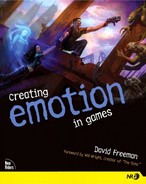Entertainment becomes art.
Art becomes commerce.
Why put emotion into games?
The answers are: art and money. Sure, it's an unholy alliance, but so are pineapple and pizza, windmills and tiny golf courses, military intelligence, and fruit and Jello™ molds.
Don't get me wrong. I think of myself as an artist first, a businessman second. Game companies that don't make a profit, however, aren't game companies for very long.
There are at least nine reasons why putting emotion in games can lead to greater profits, and it's worth taking a few minutes to mention them.
I asked Jason, a close friend of mine, if he ever played games.
“No,” he said. “If I'm going to invest my time in entertainment, I want it to have meaning. There's no meaning to games.”
Upon further questioning, I learned what he meant was that he wanted entertainment experiences that also contributed to or enriched his life in some way; experiences that weren't just fun diversions.
My friend speaks for a vast group. There are many more people who watch film and television than play games. Many of these will never be lured into playing games until games begin to offer the emotional range and depth of the entertainment they're used to enjoying.
A more involving game experience means better word of mouth or “buzz.” Just as much as the movie business, the game business depends on buzz.
The press likes to write about games that find new ways to be immersive. More press means more sales. (If you were around back then, think of all the free press received by the first Max Payne.)
The better game visuals get and the more games look like films, the more we'll instinctively compare them to films. Weak writing and shallow emotional experiences will increasingly stand out in games featuring stories and characters. Although publishers and developers will (and do) have games that look like films, most games don't have nearly the emotional sophistication of films.
When a game has emotional complexity, combined with fun gameplay, the creative team becomes more inspired by the game they are producing.
For they know they're creating not just superficial entertainment, but something that has depth, meaning, and impact.[1]
People seek out branded experiences that touch them emotionally. The Lord of the Rings films and the Spider-Man film helped ignite game sales, because people wanted to continue to be involved in the brand.
Metal Gear Solid II was an eagerly awaited game. Did it satisfy people's hunger for great gameplay? Many gamers said yes. But gamers complained that the story was unengaging—even trite and silly. The game, despite its great look for the time, sold a million less units in the United States than its predecessor.
How many millions of dollars more could the game have made if it had been more emotionally involving? And how much damage was done to the brand? How much will the next sequel not make because of the lessened passion U.S. game players felt for Metal Gear Solid II?
Once upon a time, the technological evolution between games was so dramatic that games could trump one another in sales just by having a better look or slightly more fun gameplay.
Today lots of games look great, and consumers have no shortage of choices for truly fun games.
Games that involve a player emotionally will gain a competitive advantage. Obviously, however, games still need to have fun gameplay besides looking great.
Certain game developers are working hard to advance emotion in gaming. Game designers and publishers creating games with stories and characters but not emotion will find themselves further and further behind. Their games will be eclipsed.
When emotion is added to a game, then the game will appeal to wider demographics. The game gets better press, gets better buzz, and is more likely to generate allegiance to the brand. The development team will have increased passion for the project. All this translates to increased profits and a much richer game experience.
Regarding Metal Gear Solid II, a game designer friend of mine commented, “My feeling is that a game without a story is better than a game with a bad story, because anytime a player is taken out of their connection to the game it gives him the opportunity to walk away from the game entirely.
If my friend is right, and I think he is, then poor writing can pull the player out of the story—the exact opposite of what we're trying to accomplish.
The solution seems easy: Just hire a professional writer. The next chapter, however, shows why this might not be the simple solution it seems to be.
[1] Please don't feel I'm knocking superficial entertainment. Uplifting people and giving them an arena for play by creating fun and exciting entertainment experiences—from games to roller coasters to river raft rides—is, to me, extremely worthwhile. But many creative teams find renewed inspiration when they're also creating experiences that enrich the interactive participant.
